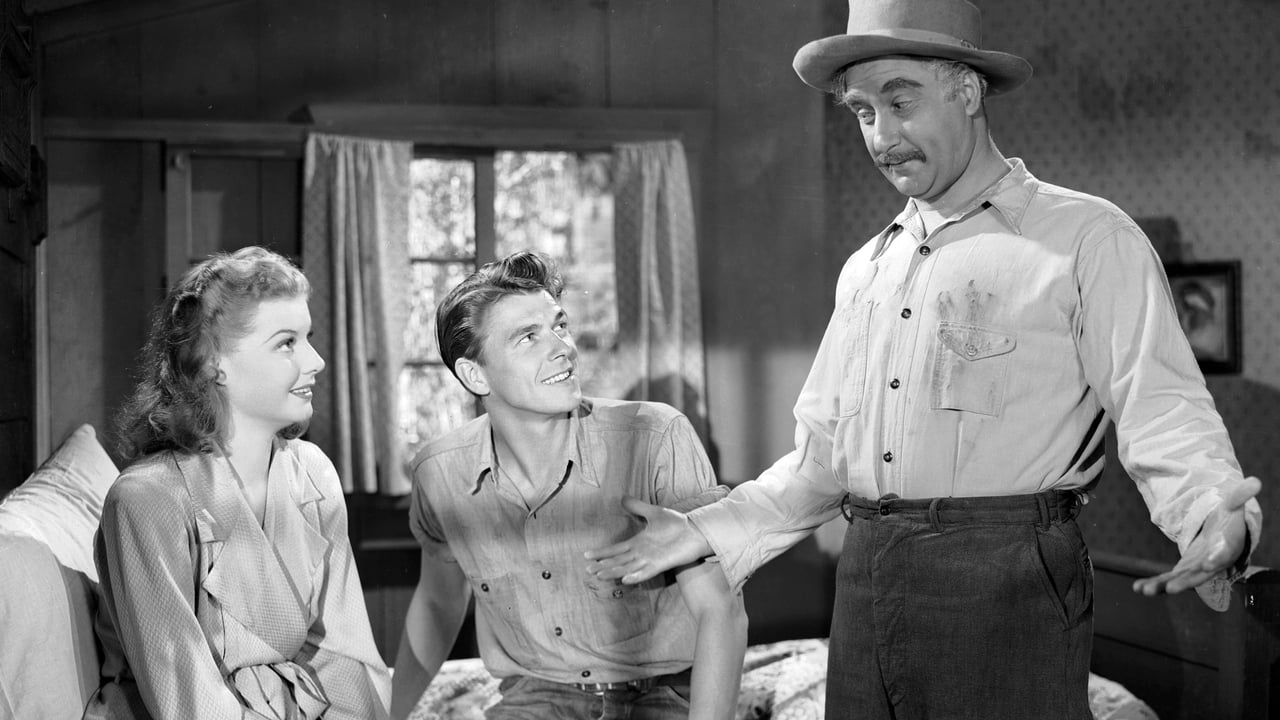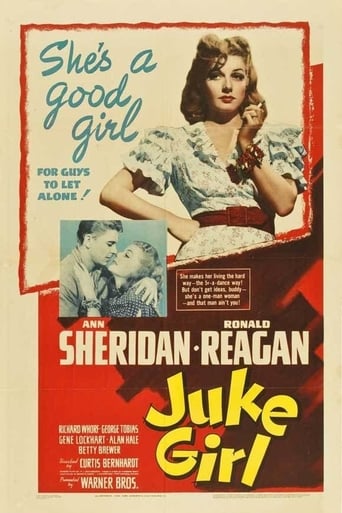

"Juke Girl" is a film from "Warner Bros" which quickly faded into obscurity not long after its release in 1942. The leads, Ann Sheridan and Ronald Reagan were in a far better film that came out the same year, "King's Row." The plot is very confusing and it's hard to keep up with what is going on from one scene to the next. A good supporting cast is largely wasted and Alan Hale in particular, has nothing to do. A few punch up scenes and location photography can't compensate for a poor story. This is only for hardened fans of the old days of Hollywood.
... View More***SPOILERS*** It's when Kansas farm boy Steve Talbot played by future US President of the United States and leader of the Free World Ronald "Dutch" Reagan hooked up with feisty redhead Florida Juke girl Lola Mears, Ann Sheridan, that things started to get hot and heavy in the little town of Cat's-Tail Florida where they both resided. It's there that big time produce mogul Henry "The Man" Madden, Gene Lockhart, had an iron grip on the farmers in exporting their tomato's beans and cabbage to the markets all over the state. In champion of the working class Steve seeing the pain and suffering that Madden is putting the local farmers through he gets involved with maverick tomato farmer Nick Garcos, George Tobias, in standing up to Madden's bulling and greedy, in him getting all the lettuce (money) and the farmers getting peanuts, tactics.It's when Nick & Steve are about to bring their crop of green beans to market up in Atlanta Georgia, out of Madden's reach, that Madden sends his goons lead by the violent but simple minded Cully, Howard De Silva, to stop his shipment of beans from getting there. With Steve preventing Madden and his goons from stopping the shipment he together with his partner Nick end up selling the prized green beans at a record price of $4.50 a crate resulting in something like a $15,000.00 profit. As for Steve's girlfriend Lola, a hot tomato herself, she in fact dumps him in order to get back to her true love being a Juke Girl at a local Atlanta saloon. But not after receiving her share of the cut, in the sale of green beans, of $3,800.00 from a grateful Nick.***SPOILERS*** Just when you think the movie is about to end on the up side things rally get wild with a drunken Nick trying to get back in the good graces, or bury the hatchet, with Madden that he gets into a drunken spat with him ending up getting his brains beat in, in self defense, by an outraged and terrified , in him getting killed himself, Madden. With all the evidence leading straight to both Steve & Lola a lynch mob is incited by the bird brained Cully to drag both Steve & Lola out of the county jail and hang them on the nearest tree. It's only when Steve's friends Danny & Yippee, Richard Whorf & Alan Hale, get Madden to confess his crime to the lynch mob that they not bothering to have him stand trail, and finding out his killing Nick was in self defense but not murder, lynched the terrified and defenseless man on the spot. Making Cully & Co. far worse criminals as well as murderers then the late Henry Madden ever was!
... View MoreDon't let the opening credits mislead you. The design of the credits and the corny music may mislead you into thinking this is going to be a second-rate comedy. It's actually a fairly effective melodrama, with a good cast, solid visual elements, and a decent script full of memorable lines.The story focuses on two migrant laborers who are following the crop season in Florida and hoping for work. Their rough-and-tumble encounter with the local "boss" (Gene Lockhart, who makes a great villain although I always think of him as Bob Cratchit) breaks up their friendship, and emphasizes the tension between the boss and the farmers who depend on him for money. Reagan's attempts to help a troubled farmer just make Lockhart angrier, leading to escalating violence. Of course, in the meantime, a romance is blooming between Reagan and a local "juke girl" (Sheridan). He wants to settle down, but she's not ready.Nicely choreographed action sequences, snappy dialog, and memorable major and minor characters make this WB feature worth seeking out.
... View MoreSurprisingly vigorous programmer showing why Warner Bros. was the blue-collar studio of record. Had the occasional goofy humor and contrived climax been improved this could have been a sleeper. Reagan is lively and likable as the quick thinking ex-farmer-- no wooden soldier here. Whorf and Sheridan are appropriately intense, helping to inject a gritty feel. Reagan's friendship with Whorf is more interesting than the predictable romance with Sheridan. Whorf, an opportunist, splits from his hoboing buddy by siding with the crooked wholesaler (Lockhart) because he sees a lucrative future with a powerful employer. Reagan, on the other hand, is an idealist, willing to risk his future to help the victimized farmer (Tobias). In my book, the dynamic between them makes up the movie's core because it often presents a real-life choice.A number of nice touches. The bar scenes are atmospheric and staffed beyond programmer expectation. In fact, the settings as a whole from the hobo jungle to the honky-tonk street show genuine carenote even the "Madden" labels in the background of Madden's (Lockhart's) office. I suspect that producer Hal Wallis, a leading Hollywood producer, had a lot to do with this level of detail for what amounts to a very unglamorous production. Note too how the wholesalers collude to cheat the farmers. I expect that resonated with audiences still recovering from the Great Depression. All in all, the movie's much better than its rather misleading title suggests. (In passingnote presence of voluptuous Faye Emerson {Murph} who later achieved New York celebrity by marrying one of the Roosevelt sons and scandalizing early TV with a series of plunging neckline guest-show appearances. Also, for uncompromisingly fierce look at trucking and wholesalers, catch noir classic Thieves' Highway {1949}).
... View More